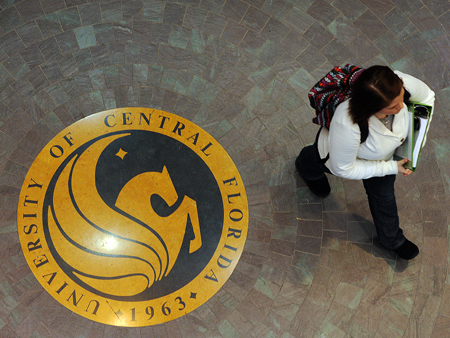The University of Central Florida Board of Trustees met Wednesday morning to announce a significant financial aid package for students that amounts to $40 million.
The Constellation Fund’s primary goal will be to help students graduate faster and with less debt, thereby supporting student success when income shouldn’t be a factor in earning a degree, UCF says.
“There’s no better tool than a college degree when it comes to advancing your future or your family’s future,” UCF President Dale Whittaker said Wednesday.
“Our commitment to excellence means investing in all of our students’ success because we know this investment will impact thousands of lives now and in the future while lifting our community and the state.”
The new funding will significantly increase the amount of institutional aid such as scholarships, grants, fellowships and assistantships that UCF provides to low and middle-income students who often are first-generation students. Nearly half of students at UCF manage their courses while working at least 20 hours a week.
The Board of Trustees identified a problem with work-life balance for those trying to pay for tuition out of pocket and suggests the solution is to relieve the weight of financial stress so that academic success will be favored.
“Nearly half of UCF students work more than 20 hours a week, which sometimes means they have to enroll in fewer classes and extend the time it takes to graduate,” a press release said. “And for some students, an unexpected medical bill or a car repair can leave them unable to enroll in the last few classes needed to earn a degree.”
The national average loan debt package a student will graduate with has rocketed to $37,172 (class of 2016) to place it higher than auto loans or credit card debt, behind only mortgages.
“The Constellation Fund allows us to make one of the nation’s best-value educations even more affordable,” UCF Board of Trustees Chairman Marcos Marchena said.
“We appreciate the Florida Board of Governors and Legislature’s focus on affordability. As one of the country’s most innovative institutions, we are committed to finding innovative ways to help our students succeed.”
The Constellation fund will use a task force with input from students, faculty, and academic leaders to develop an aid distribution and student eligibility plan by February 1 when students will be contacted. Data analytics will also intercept students at risk of not graduating by removing short-term and long-term obstacles:
- Providing crucial short-term assistance to help students overcome financial hurdles that may keep them from graduating.
- Offering the financial security necessary for students to reduce their work hours.
- Reducing student debt by replacing student loans with grants and scholarships.
- Funding additional graduate fellowships to advance UCF’s research mission.
Some scholarships may be awarded as early as Spring 2019 to help graduating students.
At this time, students do not need to contact the financial aid office; a Q&A can be found here, and the page will be updated as more information becomes available, UCF provided in a press release.
UCF is on a path of obtaining preeminence status from the Florida Board of Governors. The four-year graduation rates of students will be targeted with the Constellation fund as one of the few remaining factors left to check off. The university passed a milestone marker this year with a 90% retention rate for first-year students.
SDES and individual colleges within the university rallied to reach out to students who had yet to re-register to return to classes, solving any personal, financial, or academic problem the student might have been experiencing.
And according to UCF, college deans called students to encourage their return and offer assistance.
“This is something that has been a priority for us a long, long time,” said Ehasz.
“A year ago we got close. We learned from that how important it is to keep an eye on students through the entire registration cycle. There was a continuous effort to work with the first-year students and a specific high-intensive initiative between May and September to ensure that all students who could, were registered.”
The average retention rate among public universities from the latest data was 81.9%, Paige Borden, UCF associate vice president for Institutional Knowledge Management said. UCF then places 40th in the United States. Borden also noted that the new retention rate is 3.5% higher than the 2012 entry class, who set a six-year graduation rate record of 72.5%, enough to place top-50 nationally.




